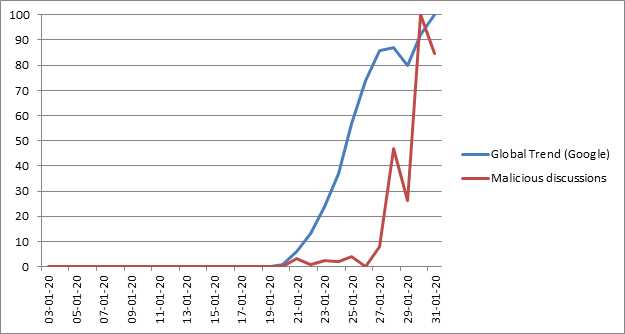Hackers tacking advantage of Coronavirus scare
By Staff Writer 19 February 2020 | Categories: news
While the world attempts to take control over the spread of the Coronavirus and tries to contain, eliminate and prevent it from spreading, hackers around the globe have found the Coronavirus serving them well as an enabler for their activities.
According to the latest report from Check Point, its Global Threat Index for January 2020, cyber-criminals are exploiting interest in the global epidemic to spread malicious activity, with several spam campaigns relating to the outbreak of the virus.
And, as physical viruses can be transmitted in various forms, through saliva, touch or even through air, malware is similar in the sense that it finds different vectors to penetrate.
The company noted that right after the huge global attention around the Coronavirus, cyber criminals started using the interest to spread their malicious activity. The graph below shows the trend line of the overall search for Coronavirus by Google Trends, along with the trend of discussions on malicious events using the Virus.

In January and February 2020 the most prominent Coronavirus-themed campaign targeted Japan, distributing Emotet in malicious email attachments pretending to be sent by a Japanese disability welfare service provider. The emails appeared to be reporting where the infection is spreading in several Japanese cities, encouraging the victim to open the document for more information. When the document was opened, Emotet was downloaded onto the victim’s computer.
Emotet is an advanced, self-propagating and modular Trojan. It was originally a banking Trojan, but recently has been used as a distributor of other malware or malicious campaigns. It uses multiple methods to maintain persistence and evasion techniques to avoid detection. It can also spread through phishing spam emails containing malicious attachments or links.
In addition to email campaigns, since the Coronavirus outbreak, Check Point reported a noticeable number of new websites registered with domain names related to the virus.
Many of these domains are expected to be used for phishing attempts. As for now, Check Point already spotted and protects online users from many websites known to be related to malicious activities that lure the victims to their websites with discussions around the virus, as well as from scam websites that claim to sell face masks, vaccines, and home tests that can detect the virus.
An example of such a website is vaccinecovid-19\.com. It was first created on February 11, 2020 and registered in Russia. The website is insecure, and offers to sell “the best and fastest test for Coronavirus detection at the fantastic price of 19,000 Russian rubles (about US$300)”.
The website also offers pieces of news and a heat map of the Coronavirus spread, but on closer look one can see that it is immaturely designed, providing instructions and comments such as “ a place for a beautiful subtitle” (in English translation).
Staying protected
As to how can you avoid falling victim to these scam attempts, Check Point offered some tips for safe online behaviour:
1. Beware of “special” offers. An “exclusive cure for Coronavirus for $150" is usually not a reliable or trustworthy purchase opportunity.
2. Beware of lookalike domains, spelling errors in emails or websites, and unfamiliar email senders.
3. Protect your organization with an holistic, end to end cyber architecture, to prevent zero-day attacks
Most Read Articles

Have Your Say
What new tech or developments are you most anticipating this year?



